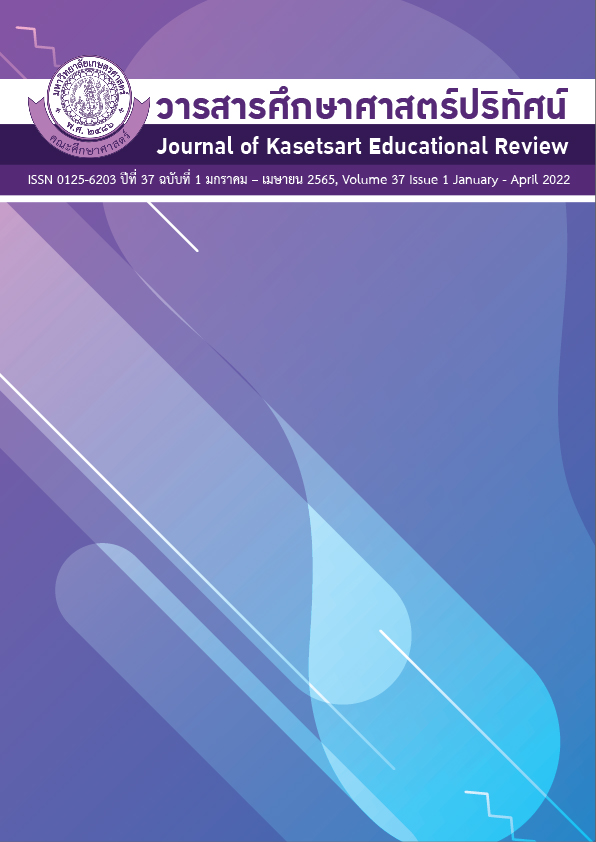ผลของการจัดการเรียนรู้โดยใช้ปรากฏการณ์เป็นฐานที่มีต่อความรู้ด้านสิ่งแวดล้อม สำหรับเด็กปฐมวัย
คำสำคัญ:
ความรู้ด้านสิ่งแวดล้อม, การจัดการเรียนรู้โดยใช้ปรากฏการณ์เป็นฐาน, เด็กปฐมวัยบทคัดย่อ
การวิจัยครั้งนี้มีวัตถุประสงค์ เพื่อศึกษาผลการจัดประสบการณ์การเรียนรู้โดยใช้ปรากฏการณ์เป็นฐานที่มีต่อความรู้ด้านสิ่งแวดล้อมสำหรับเด็กปฐมวัย ใน 3 ด้าน ได้แก่ ด้านกายภาพและระบบนิเวศ ด้านทรัพยากร และด้านปัญหาสิ่งแวดล้อม กลุ่มตัวอย่างเป็นเด็กปฐมวัยชายและหญิงอายุระหว่าง 4 – 5 ปี ที่กำลังศึกษาอยู่ในระดับชั้นอนุบาลปีที่ 1/9 ภาคเรียนที่ 2 ปีการศึกษา 2563 ของโรงเรียนพระยามนธาตุราชศรีพิจิตร์ จำนวน 6 คน ได้มาโดยใช้วิธีเลือกแบบเจาะจง เครื่องมือที่ใช้ในการศึกษาครั้งนี้ ประกอบไปด้วย 1) แผนการจัดการเรียนรู้โดยใช้ปรากฏการณ์เป็นฐาน 4 ปรากฏการณ์ ได้แก่ ภัยแล้ง ขยะล้นเมือง น้ำท่วม และ ฝุ่น PM 2.5 จำนวน 24 แผน 2) แบบประเมินความรู้ด้านสิ่งแวดล้อมสำหรับเด็กปฐมวัย 3) แบบบันทึกหลังการจัดการเรียนรู้โดยใช้ปรากฏการณ์เป็นฐาน พร้อมทั้งการสัมภาษณ์ผู้ปกครองเกี่ยวกับความรู้ด้านสิ่งแวดล้อมสำหรับเด็กปฐมวัย วิเคราะห์ข้อมูลโดยใช้ค่าเฉลี่ย และวิเคราะห์เนื้อหา
ผลการศึกษาพบว่า เด็กปฐมวัยที่ได้รับการจัดการเรียนรู้โดยใช้ปรากฏการณ์เป็นฐาน มีคะแนนความรู้ด้านสิ่งแวดล้อมหลังการทดลองสูงขึ้นกว่าก่อนการทดลองทั้งโดยรวมและรายด้าน โดยหลังการทดลอง พบว่า เด็กปฐมวัยมีความรู้เกี่ยวกับเรื่องสิ่งมีชีวิตและสิ่งไม่มีชีวิตในสภาพแวดล้อมรอบตัว สามารถบอกความต้องการพื้นฐานของสิ่งมีชีวิตได้ มีความรู้ ความเข้าใจในเรื่องกระทำของมนุษย์ที่ส่งผลต่อสิ่งแวดล้อม วิธีการใช้ทรัพยากรอย่างมีคุณค่า บอกถึงผลกระทบที่เกิดขึ้นจากสิ่งแวดล้อม และ สามารถสื่อสารวิธีการแก้ไขปัญหาสิ่งแวดล้อมได้ดีขึ้นกว่าก่อนการทดลอง
เอกสารอ้างอิง
Butkatanyoo, O. (2018). Phenomenon-based learning for developing a learner’s holistic views and engaging in the real word. Journal of Education Studies, 46(2) : 348 - 365. [in Thai]
Damerell, P. Howe, C. & Milner-Gulland, E. (2013). Child-Oriented Environmental Education Influences Adult Knowledge and Household Behaviour. Environmental Research Letters, 8(15016), 1-7.
Daehler, K.R. & Folsom, J. (2016). Making sense of science : phenomena-based learning. Retrieved from https://wemss.weebly.com/ uploads/8/6/4/9/8649828/ mss_pbl.pdf.
Eckstein, D. Kunzel, V. Schafer, L. and Winges, M. (2018). Who suffers Most from Extreme Weather Events? Weather-related Loss Events in 2017 and 1998 to 2017. Retrieved from. https://germanwatch.org/ en/16046.
Hollweg, K., Taylor, J., Babee, R., Marcinkowski, T., Mcbeth, W., and Zoido, P. (2011). Developing a framework for assessing environmental literacy. Retrieved from. https://cdn.naaee.org/sites/default/files/devframewkassessenvlitonlineed.pdf.
Kompa, J. (2017). Remembering Prof. Howard Barrows: Notes On Problem-based Learning And The School of The Future. Retrieved from. https://joanakompa.com/ tag/phenomenon-based-learning/
Mahavijit, p. (2017). Learning innovation from Finland. The Institute for the Promotion of Teaching Science and Technology, 45(209): 40-45. [in Thai]
Massachusetts Department of Elementary and Secondary Education. (2016). Science and Technology Engineering Framework Download PDF Document. Retrieved from. https://www.doe.mass.edu/ frameworks/scitech/2016-04.pdf.
Miranda, A., Brito, C., Jofili, Z., Carneiro, A. & Mdos, A. (2017). Ecological literacy – Preparing children for the twenty-first century. Early Child Development and Care, 187(2), 192-205.
Nazaruk, S. K. and Klim-Klimaszewska, A. (2017). Direct learning about nature in 6-year-old children living in urban and rural environments and the level of their knowledge and skills. Journal of Baltic Science Education. 16(4), 524-532.
Office of Natural Resources and Environmental Policy and Planning. (2019). State of the Environment 2019. Bangkok: Printing Company B.T.S. Press Company. [in Thai]
OECD. (2019). OECD Future of Education and Skills 2030 Concept. Retrieved from file:///C:/Users/P/Desktop/Knowledge_for_2030_concept_note.pdf.
Office of Education and the Environment. (2013). The California Education and the Environment Initiative (EEI) Curriculum. Retrieved from https://www.californiaeei.org/.
Office of Child Development and Early Learning. (2014). Pennsylvania Learning Standards for Early Childhood pre – kindergarten. Retrieved from https://www.pakeys.org/pa-early-learning-initiatives/early-learning-standards/.
Office of Child Care. (2019). Alaska Early Learning Guidelines. Retrieved from https://www.alaskaelg.org/.
The Institute for the Promotion of Teacher Science and Techonology. (2020). Frameworks and approaches for organizing integrated learning experiences Science, technology and mathematics at the early childhood According to the curriculum of early childhood education. Bangkok: Go go print (Thailand) Company Limited. (in Thai)
Umponpong, A. (2016). Development of lesson on the internet to constructivism Theory for encourage of ability the design technology for demonstration Chulalongkorn university demonstration school. (Master of Education thesis) Chulalongkorn university, Bangkok. [in Thai]
Veeravatnanond, V. (2003). Environment Education. Bangkok: Qdeonstore. [in Thai]
West Virginia Board of Education. (2019). West Virginia Pre-K Standards (Ages 3-5). Retrieved from https://wvde.us/wp-content/uploads/2019/05/PKStandardsBookletUPDATE-Final-May-2019.pdf
ดาวน์โหลด
เผยแพร่แล้ว
ฉบับ
ประเภทบทความ
สัญญาอนุญาต
ลิขสิทธิ์ (c) 2022 วารสารศึกษาศาสตร์ปริทัศน์

อนุญาตภายใต้เงื่อนไข Creative Commons Attribution-NonCommercial-NoDerivatives 4.0 International License.
บทความทุกบทความเป็นลิขสิทธิ์ของวารสารคณะศึกษาศาสตร์ มหาวิทยาลัยเกษตรศาสตร์ วิทยาเขตบางเขน
วารสารศึกษาศาสตร์ปริทัศน์ (Kasetsart Educational Review)






